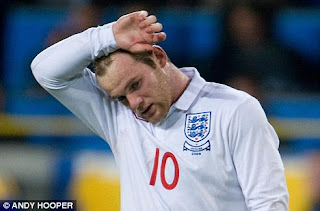"Somebody must have gone down the pub at lunchtime and scribbled the rankings on the back of a beer mat because they are ridiculous," wrote Robbie Savage in his Daily Mirror column last month. While Savage isn't known to hold back, this pretty much sums up the view of most British journalists on the FIFA rankings for international teams.
We've seen recent headlines on the subject such as, "Rank Failure" (The Sun), "You're having a laugh" (Daily Mirror) and "This is getting silly now" (Daily Mail).
This view is primarily based on England being in a lofty 5th position (and as high as 3rd in August). Matthew Norman wrote an article in the Telegraph suggesting that the ranking was "Fifa's cunning plan to blind us to our inadequacy."
So is there something fundamentally flawed with the ranking calculations or is this just another case of over zealous journalism?
In the previously mentioned Telegraph article, Norman goes on to state that the calculation, "appears to be a mathematical formula melding the more opaque calculations of the Duckworth-Lewis method with the most abstruse aspects of quantum gravity theory."
 |
Something like this maybe? |
Having decided to take the plunge and have a closer look at the calculations, it was surprising to find that they are actually very simple and easy to follow. Points are awarded to teams for each match played based on only 3 factors:
1) The result
2) The competition it was played in
3) How strong the opposition was
The formula is simply:
Points Scored = M x I x T x C
M is the match result. 3 for a win, 1 for a draw and 0 for a loss. If a match is won on penalties then the winning team gets 2 and the losing team 1.
I is the match importance. This can only have one of 4 values - 1 for a friendly; 2.5 for a World Cup or confederation tournament (e.g. Euros, Copa America, African Nations etc.) qualifier; 3 for a confederation tournament match or 4 for a World Cup tournament match.
T accounts for the strength of the opposition based on their prevailing ranking. The top ranked team (currently Spain) are given a value of 200, the second 199 and so on; while teams ranked 150 and below are assigned a minimum value of 50.
C is minor adjustment for the strength of the opposition's confederation. The values are based on performances in the last 3 World Cups, and currently European and South American teams are given a value of 1, the Central and North Americans 0.88, Asian and African teams 0.86 and Oceanic teams 0.85.
So simply put there are only 3 factors that influence the rankings points earned - the result, the importance of the match, and the strength of the opposition.
 |
| Woo hoo Wazza... even we can understand that! |
The only slight complicating factor is that while matches are over a full World Cup cycle are taken into account (i.e. the last 4 years results), more recent results are given greater importance. So matches in the last 12 months are given 100% value, the next 12 months 50%, the 12 months after that 30% and the remaining results only 20% of their original value. Once a match is over 4 years old it drops off and no longer factors in the ranking calculation.
Ok so the calculations are fairly straight forward and logical in principle, and could be done by anyone with a GCSE in Maths. So why the disconnect between England's lofty position, and many journalist's opinion of where they should be?
The probable answer to that question is that the rankings are representative of performance over a sustained period in all matches and not designed to be a replication of tournament success. Tournament games rightly carry a heavier weighting in the calculations, hence Spain's position as clear no.1 is no surprise. But friendlies and qualification matches also play their part. Given the huge emphasis the press and public put on tournament progression, this is probably where the disconnect lies.
 |
| Is it possible to discuss England without mentioning you know what? Don't be silly... |
To evaluate the claim that the rankings are a poor representation of reality, it is worth looking at the performances of the teams around England, which many journalists clearly believe to be far superior outfits.
3rd placed Portugal performed averagely in the last two tournaments, reaching the Last 16 in 2010 and the Semis at Euro 2012. They also only scrapped through qualifying for both tournaments, coming 2nd in their group to Denmark both times, and only reaching the tournaments via the playoffs.
 |
| Please not Spain again... |
4th placed Argentina struggled to qualify for WC2010, coming 4th placed in South America behind Chile and Paraguay, having won only 8 of their 18 qualification matches. They also were knocked out at the last 8 stage of the Copa America last year (a tournament with only 12 teams), having only won 1 of their 4 matches, and that against a weak Costa Rica side.
 |
| An amazing forward line... but Messi results |
6th placed Netherlands have been generally superb in the last 4 years but they crashed out of Euro2012 after 3 straight defeats in the group stages. As much as England's performance in the tournament disappointed their supporters, imagine how the Dutch felt.
 |
| Oh dear... |
7th place Uruguay had a fantastic 2010 World Cup and won the 2011 Copa America, but their 2012 results (which carry the highest weighting) have been poor. In their 9 games this year they have only managed a single win against Peru, with 5 draws and 3 losses in the remaining 8 matches.
8th placed Italy have certainly seen an upturn in results since the arrival of Cesare Prandelli culminating in reaching the final of Euro 2012. But only 2 years ago in South Africa they came bottom of a group containing Paraguay, Slovakia and New Zealand, failing to win a single match.
 |
| Rolled over by the minnows |
In places 9-12 are Colombia, Greece, Croatia and Russia. Teams who haven't exactly had much notable success, and who surely no one would think should be above England on current form.
13th and 14th are the more interesting cases of France and Brazil. France have performed poorly in the last 2 tournaments with 1 draw and 2 losses at WC 2010 and 1 win, 1 draw, 2 losses at Euro 2012. Brazil only reached the World Cup quarter finals and only won one match at the 2011 Copa America. Being hosts for 2014 they are also suffering from a lack of qualifying matches, which is naturally hurting their ranking.
 |
| The only way is up |
Beyond that, Switzerland, Ivory Coast, Chile, Denmark, Mexico and Ecuador complete the top 20. Again, can it be genuinely said that any of these teams have performed more strongly than England in the last 4 years?
There is no doubt England are in a transitional phase with a new manager and the long running John Terry saga causing unwanted distractions. While there has been justified criticism of England's recent performances, they are nevertheless unbeaten in the 11 games Roy Hodgson has been in charge. In fact since getting knocked out of the 2010 World Cup to Germany England have only lost 2 games, and both were friendlies, against France and Holland.
 |
| How are we still unbeaten? No idea... |
Once again it needs to be made clear that the purpose of the rankings is to be a representation of success over a sustained period in all matches and not just to replicate tournament performances. The frustration for England fans is that, after recent disappointments, they don't feel they are the realistic contenders to win a tournament that a no.5 ranking would suggest.
Unfortunately for the England situations have conspired against them in the last 2 tournaments. In 2010 they lost captain Rio Ferdinand to injury in the build-up, while star player Wayne Rooney was suffering from an ankle injury, and was a long way short of his best form.
 |
| Only 15 mins played? I'm knackered! |
Their Euro 2012 preparation was disrupted by the John Terry saga and Fabio Capello's subsequent resignation. Roy Hodgson barely had time to prepare for the tournament and subsequently was hit by injuries to Frank Lampard, Gareth Barry, Chris Smalling, Kyle Walker and Gary Cahill. With Tom Cleverly also unavailable and no SOS being put out to Michael Carrick or Paul Scholes, Hodgson was left having to use Jordon Henderson as back-up for Parker and Gerrard in central midfield.
 |
| Oh dear, we both know it's game over now... |
Tournaments also offer a very specific set of circumstances that England seem incapable of dealing with. They always come at the end of the season, when Premiership players are often tired, given the pace, competitiveness and - given the lack of a winter break - relentlessness of the competition. They also seem to suffer from the media scrutiny and weight of expectation from supporters. Lastly, tournaments, unlike qualification matches, are mostly played in hotter summer conditions, where more calculated possession based football is likely to generate greater success than the higher tempo game seen in the Premier League.
Yes the calculations could be tweaked to give more weighting to tournament matches, and give bonuses for progressing further. But that would further complicate them and only further dilute the value of friendlies and qualifying games.
The problem is not really with the rankings, or their complexity, but more the disconnect between their actual purpose and what the media and supporters think they should represent.




No comments:
Post a Comment